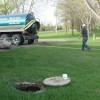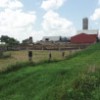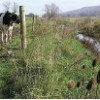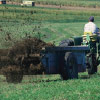How does bacteria enter our water?
Bacteria enters water from leaking septic systems, wastewater treatment plants, farm animals or wild animals. All major waterborne diseases are spread the same way—by drinking or entering water that is contaminated by infected human or animal fecal waste.
What are bacteria’s health effects?
Drinking water contaminated by bacteria can cause serious human illness. E. coli, the most common fecal coliform bacterium, can be lethal in if ingested.

Urban
 If you have a septic system, maintain it.
If you have a septic system, maintain it.Be sure your system is well-installed. Keep it working properly by using less water and fewer household cleaners. Keep kitchen waste out of the system and pump the tank as needed, every one to three years.
 Pick up after pets.
Pick up after pets.Clean up pet waste often at home. When walking your dog, carry a plastic bag, put waste in a knotted bag, and put the bag in the garbage can—never the storm sewer!
 Plant trees and native plants.
Plant trees and native plants.Tree and native plant roots, leaves and branches absorb water and help rain soak into the soil. This reduces stormwater runoff that carries bacteria to streams.
 Build rain gardens.
Build rain gardens.Rain gardens are simple structures—a dip in the earth—built to catch rain water and reduce runoff and bacteria contamination.
Rural
 Maintain your septic system.
Maintain your septic system.Be sure your system is well-installed. Keep it working properly by using less water and fewer household cleaners. Keep kitchen waste out of the system and pump the tank as needed, every one to three years.
 Manage manure.
Manage manure.Follow a manure management plan with attention to housing, manure storage, runoff control structures, spreading practices and possible prescribed grazing.
 Manage stream corridors.
Manage stream corridors.Restrict access to streams when possible to prevent urination and defecation in streams.
 Prevent runoff.
Prevent runoff.When applying manure, incorporate or inject. Timing is important; apply when ground is not saturated, and when rain and snow-melt are not expected.

